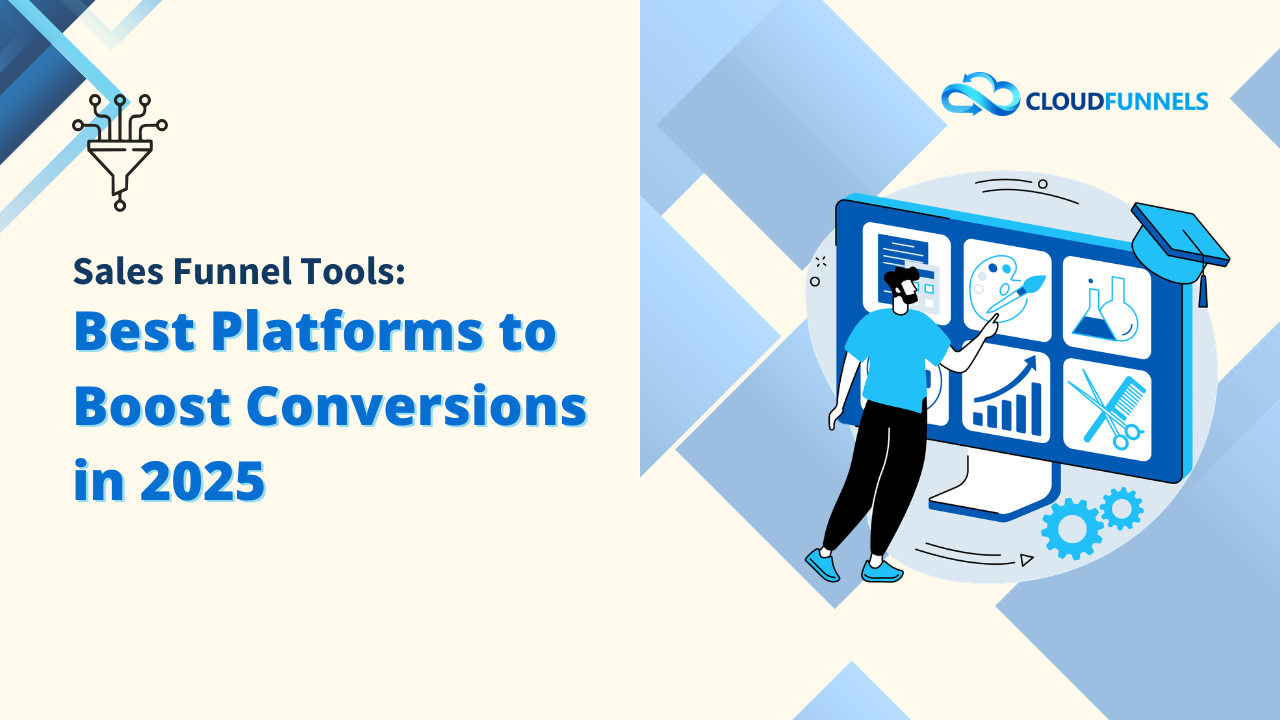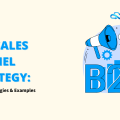Do you need help converting leads into customers? In 2025, sales funnel tools are no longer a luxury—they’re necessary for businesses of all sizes. You need to design a process that’s so compelling that your audience can’t help but convert.
Studies show that businesses using sales funnel tools see a 20% increase in conversion rates. But how do you achieve that? What’s the key element that can help you succeed online and boost your sales and conversions? The answer lies in a perfect sales funnel tool.
Sales funnel tools are a key part of inbound marketing. They guide users through a series of steps that make it easy for them to convert.
In this article, you’ll explore what sales funnels are, what key features to look for, and how to choose the right one, and you’ll highlight the best sales funnel tools available for your business.
So, let’s dive in!
What is a Sales Funnel Tool?
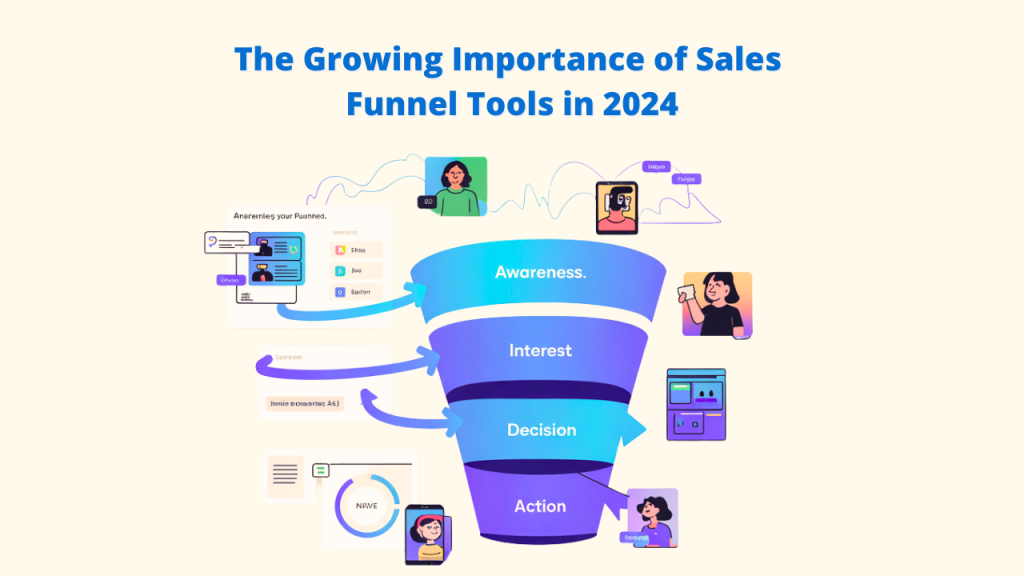
A sales funnel tool is software designed to guide potential customers through their buying journey, from initial awareness to final purchase. These tools automate and optimize each stage of the sales process, helping businesses nurture leads more effectively.
In 2025, sales funnel tools are crucial due to:
- Consumer behavior becomes increasingly complex.
- The need for personalized marketing at scale
- Growing competition in the digital market
Sales funnel software provides a complete view of your sales and marketing efforts, allowing you to monitor campaigns and quickly make adjustments for the best customer experience.
Key Features to Look for in the Sales Funnel Tool
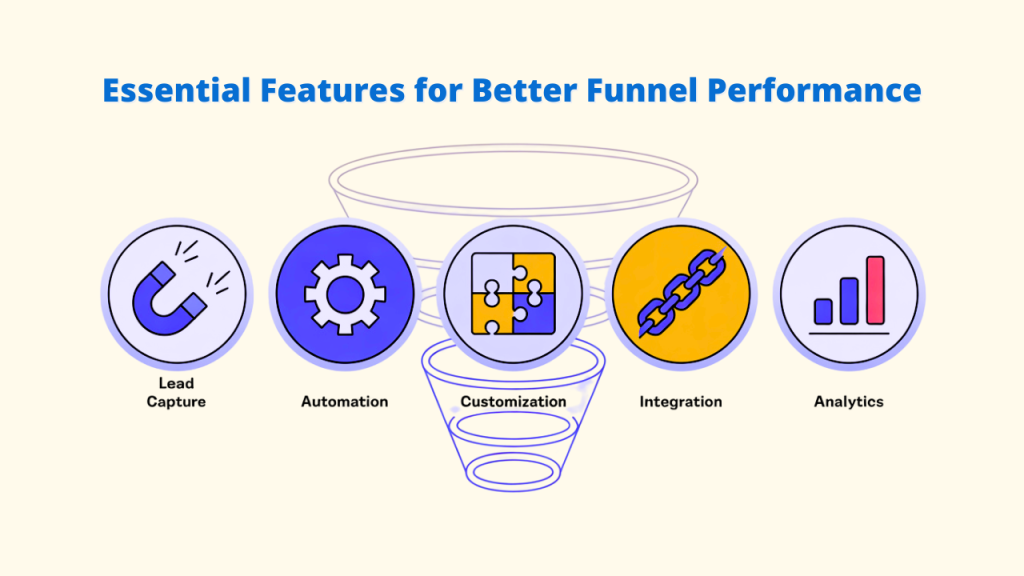
Sales funnel software helps identify, track, and improve each stage of the sales process for better efficiency. Here are the key features to look for to boost your revenue management:
1. Lead capture and segmentation:
To turn leads into clients, effective lead management is necessary. Choose tools that let you easily capture, organize, and track leads. This helps you follow up with the right message at the right time.
2. Automated Features
Automation is a game-changer in sales funnel tools. It saves time, reduces human error, and ensures consistent follow-up. The best tools offer automation features for email campaigns, lead nurturing, and customer segmentation.
3. Customization and Flexibility
Your business is unique, so your sales funnel should be too. It’s vital to have flexible features and customizable templates if you want to customize it to meet your specific needs.
4. Integration with Other Tools
The right sales funnel solution should be able to work in harmony with your current CRM, email marketing, and analytics platforms. This ensures a smooth flow of data and improves overall efficiency.
5. Analytics and Reporting
Understanding the performance of your sales funnel requires detailed analytics and reporting. Choose tools that offer insights into conversion rates, customer behavior, and ROI. This will help you make informed, data-driven decisions.
Top Sales Funnel Tools for 2025
1. CloudFunnels
Overview: CloudFunnels is the best tool to build an effective sales funnel. It helps you at every step of the entire process, and you can confidently convert your leads into lifelong customers with this software.
CloudFunnels is the only tool you need to run your entire sales process. Right from customer awareness and acquisition to follow-up, CloudFunnels takes care of everything.
Pros:
- Create opt-in pages, lead pages, squeeze pages, or landing pages.
- Create memberships for your customers.
- Email your customers with in-built email marketing.
- Make sales pages and integrate them with all major payment systems.
- Integrate with all leading CRMs and Zapier too.
Cons:
- Advanced features are limited for experienced users.
- Beginners will face a slight learning curve, despite the intuitive interface.
Cloudfunnels Pricing:
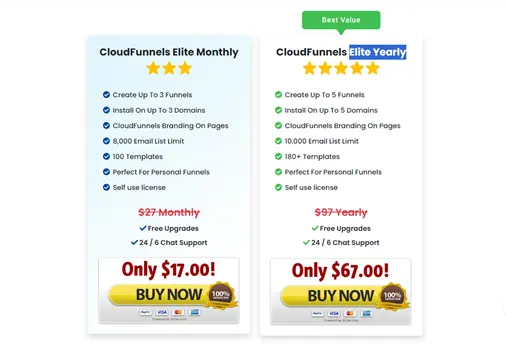
- Starter plan for $17/month
- Elite Yearly plan for $67/month.
2. Systeme.io
Overview: Systeme.io is an affordable funnel builder packed with features. It’s an excellent all-in-one marketing suite for budget-conscious online businesses. This software provides entrepreneurs and online marketers with the tools they need to succeed online. You can use it to create landing pages, run email campaigns, build online courses, and manage e-commerce transactions all in one place.
Pros:
- Affordable pricing
- Integrated course platform
- Extensive Features
Cons:
- Less robust than some competitors
- A setup guide is missing.
- Steeper learning curve compared to some options
Systeme.io Pricing:
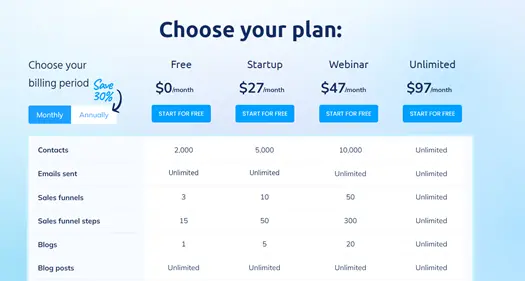
- Initial plan for $0 per month
- Startup plan for $27 per month.
- Webinar plan for $47 per month.
- Enterprise plan for $97 per month.
3. ClickFunnel
Overview: ClickFunnels helps businesses easily build sales funnels with a drag-and-drop tool for creating fully customized landing pages. It’s a user-friendly builder that allows you to design high-converting pages without any coding. You can customize every part of your sales funnel, from the initial opt-in page to the upsell. ClickFunnels also includes A/B testing to compare different landing pages and find out which one converts visitors into customers more effectively.
Pros:
- User-friendly interface
- Comprehensive feature set
Cons:
- Limited advanced customization options
- Expensive pricing.
ClickFunnels Pricing:
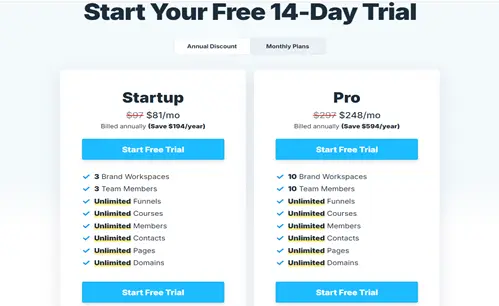
- Starter Plan for $81/month.
- Pro Plan is $248/month.
Overview: While ActiveCampaign is mostly known for email marketing, it also has powerful sales funnel and automation features. It helps you manage and automate customer and lead interactions at every stage. Key features include email marketing, deal forecasting, and personalization at every customer touchpoint. But unlike other solutions, ActiveCampaign offers its tools separately.
Pros:
- Strong email marketing integration
- Advanced automation features
- Good analytics and reporting
Cons:
- No free plan
- In terms of design, its templates are rather simple.
- It may be overkill for businesses solely focused on sales funnels.
Active Campaigns Pricing:

- Starter Plan for $19/month.
- Plus plan for $49/month.
- Pro Plan for $79/month
Marketing tools are priced separately.
5. Kartra
Overview: Kartra is an all-in-one platform that combines sales funnels, marketing automation, membership sites, email marketing, and video hosting. This unified approach simplifies your business operations by eliminating the need for multiple tools. With Kartra, you can create effective sales funnels, automate marketing tasks, deliver content, and build an online community.
Pros:
- Great ‘all-in-one’ platform
- Pro-looking templates for pages in the funnel
- Great knowledge base (“Kartra Academy”)
Cons:
- Not the simplest tool to use overall.
- No bulk uploading
- Limit video bandwidth usage
Katra Pricing :
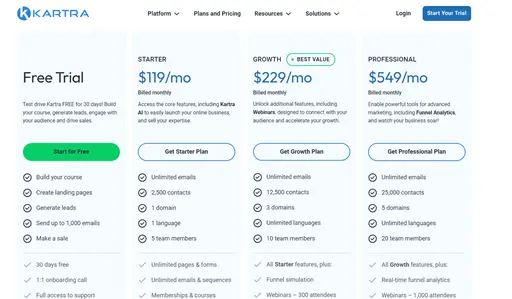
- Starter Plan for $119 per month
- Growth Plan for $229 per month
- Professional Plan for $549 per month
| Tool | Features | Pricing | Easy to Use | Best for |
| CloudFunnels | AI tools, 180+ templates, GDPR compliance, integrations with payment gateways and CRMs | $17 per month | Yes | Small to medium businesses |
| Systeme | Funnel building, email marketing, automation | Startup plan costs $27/month.The webinar plan costs $47/month. | Very Easy | Entrepreneurs, small businesses |
| ClickFunnels | Landing pages, sales pages, membership sites | The initial plan costs $81/month.Pro Plan costs $248/month. | Moderate | Marketers, robust needs |
| ActiveCampaign | Email marketing, automation, CRM | Professional plan $49/month | Moderate | Email-focused businesses |
| Karta | All-in-one marketing suite | Starter Plan for $119 per month | Advance | Advanced users, complete solution |
How Your Business Can Select the Best Sales Funnel Tool
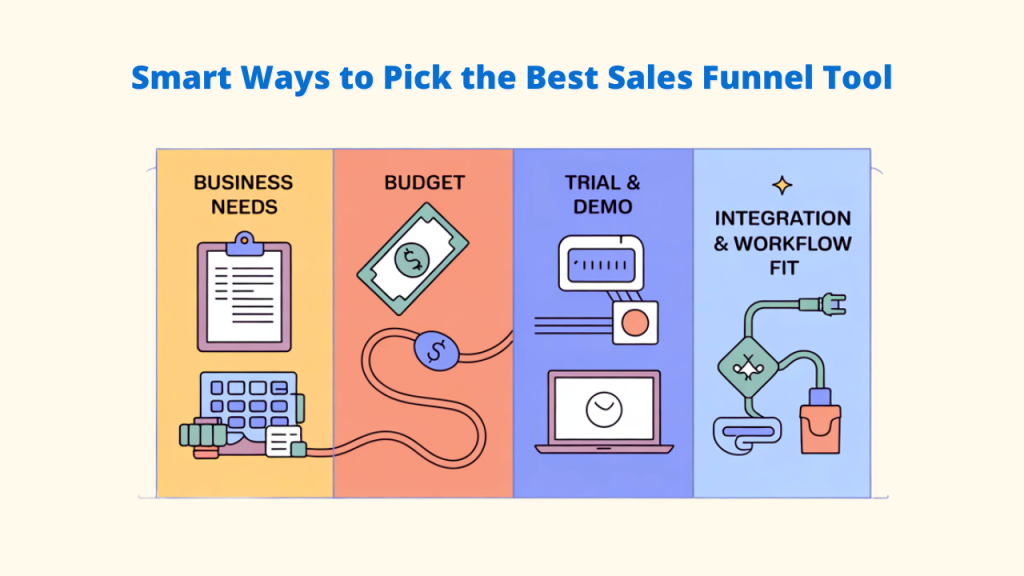
With so many sales funnel tools out there, it can be hard to choose the right one. When you’re narrowing down options, testing, and selecting software, keep this in mind:
- Assess the needs of your business: While choosing the right tool, you need to consider your specific requirements, such as integration with existing tools or growth possibilities.
- Considerations on the budget: Balance cost with the features of the tool, but remember that a more expensive tool might offer better ROI so choose wisely.
- Trial Periods and Demos: Take advantage of free trials to test the user experience and functionality firsthand.
So, when choosing sales funnel software, consider these key factors to identify the specific problem you’re solving and the features you need, determine who will use the software and how it integrates with your existing tools, focus on the outcomes you want to get, and ensure it fits well with your current workflows. Every brand is unique, so choose a tool that aligns with your specific needs and aims.
Future Trends in Sales Funnel Tools
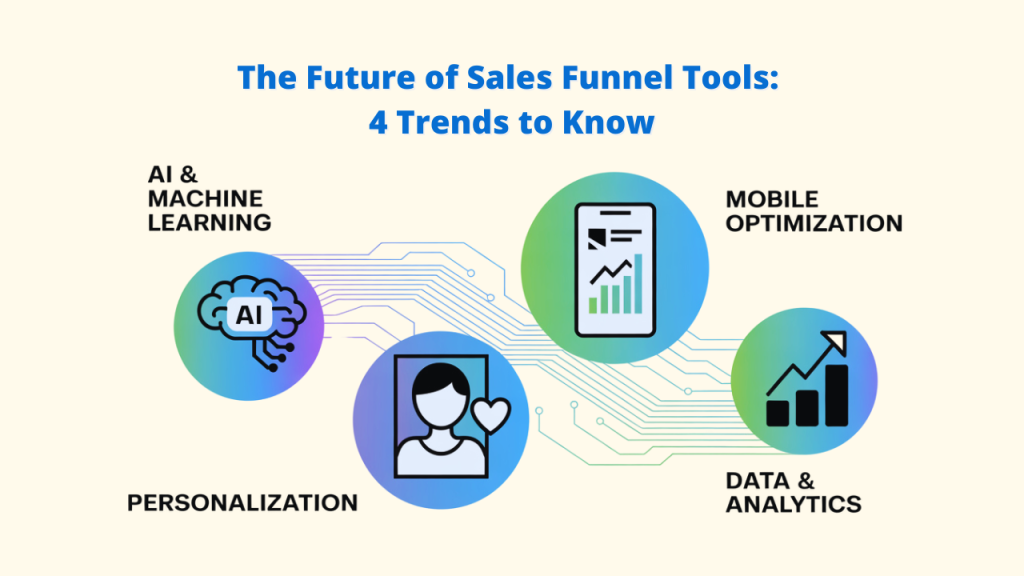
1. Machine learning integration and AI
AI (artificial intelligence) is set to transform sales funnel tools by providing insights and personalized customer experiences. To see more tools that use AI to improve decision-making and targeting.
2. Improved Personalization
Sales funnels will become more customized, with tools creating personalized customer journeys based on user behavior and preferences.
3. Mobile Optimization
As mobile usage grows, sales funnel tools are becoming more mobile-friendly, ensuring businesses can reach customers on any device.
4. Data Visualization and Analytics
Advanced data visualization tools make it easier to understand complex data and provide actionable insights. Real-time analytics allow businesses to continuously monitor sales funnel performance and make quick, data-driven decisions.
Conclusion
If you’ve made it this far, you likely have a good understanding of the tools we’ve discussed. You’ve seen their prices, features, pros, and cons, and you’re now ready to choose the best option for your business.
Take time to evaluate your specific needs and budget, and consider starting with a tool that offers a free trial. This will let you test its features and see if it fits your workflow.
It’s important to understand your business’s unique demands. For instance, if you need a budget-friendly and comprehensive solution, I recommend CloudFunnels.
CloudFunnels is an all-in-one platform for creating interactive, conversion-focused websites. It provides features designed to boost your profits.
When choosing the right tool, think about your specific needs, budget, and long-term goals. The best tool is the one that aligns with your business strategy and helps you turn more leads into loyal customers.
Are you prepared to boost sales to new heights? Click here

